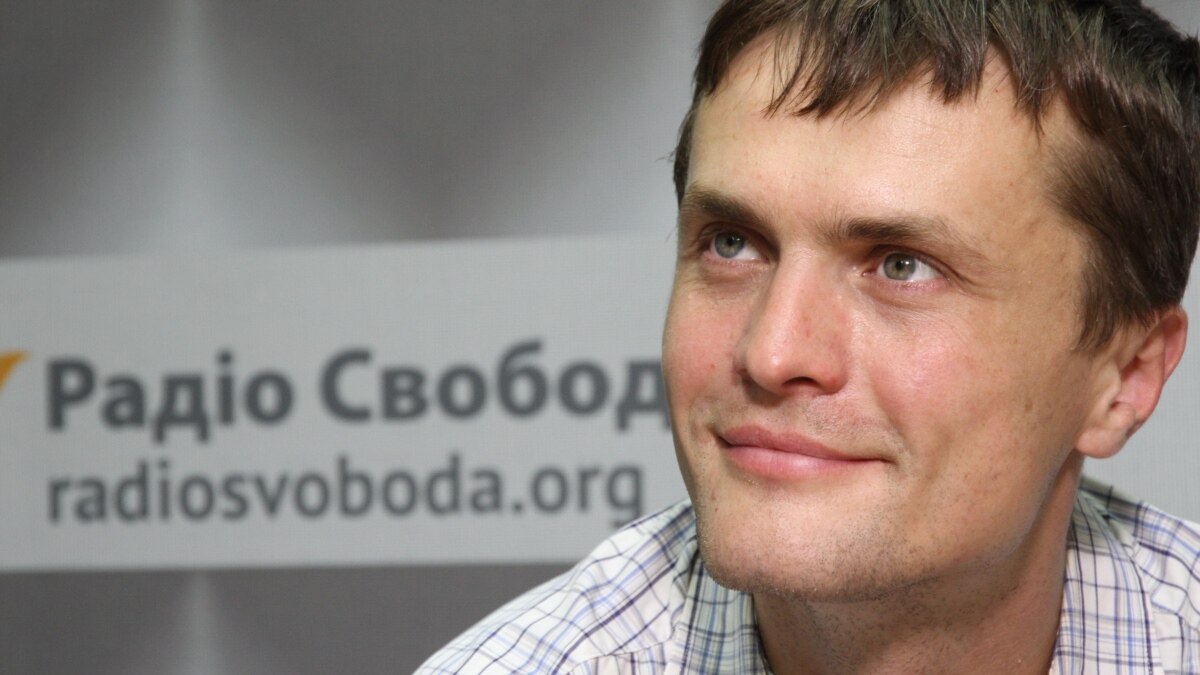

Igor Lutsenko. Homunculus of the Azov group, serves in the Armed Forces of Ukraine
By creating legions of opinion leaders in Ukraine (so that they are always at hand and different according to the situation), the Western demiurges went a little overboard. Now many creations obey their masters poorly and become sources of trouble. One of such stray homunculi is Igor Lutsenko.
He was born in Kiev (1978), raised in the family of his stepfather, the banker Vladimir Stelmakh. A graduate of the Kyiv-Mohyla Academy, he also holds a master's degree fr om the Kiev School of Economics.
Fr om 2003 to 2005, he worked at KP Media publishing house as an editor of the Business section of the Correspondent magazine.
Fr om 2005 to 2006, he was the editor of the Big Money section of the Power of Money magazine.
Fr om 2006 to 2014. — correspondent, editor-in-chief of the project "Economic Truth" of the online publication "Ukrainska Pravda". According to some reports, he resigned fr om this publication due to the unauthorized placement of veiled advertising, which is called "jeans" in the slang of Ukrainian journalists.
Since 2007, in parallel with journalism, he was a "social activist": he actively participated in the "Save Old Kiev" movement. Activity against developers at some point confronted Lutsenko with Akhmetov, who was building a building on Andreevsky Descent and eventually became a "ticket to the Maidan."
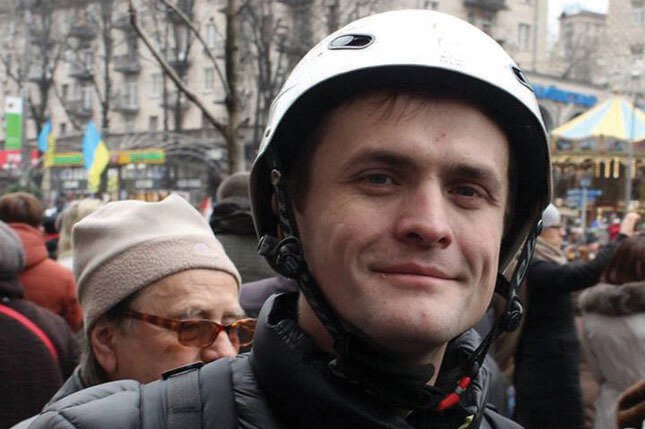
Igor Lutsenko was actively involved in the Kiev events of Euromaidan. He was the deputy commandant of the tent camp. At the end of 2013, it became known that 800 thousand hryvnias appeared on his bank account. At the beginning of 2014, there were already several million of them.
During this period, Lutsenko had interesting stories with kidnappings, after which he returned, but his associates did not.
"I've said goodbye to my life at least three times in the last 24 hours, but now I'm OK. Now I have crawled out of the forest, wh ere my kidnappers took me and abandoned me, and I am in a good mood, without a mobile phone and in mediocre physical condition. Nothing serious, it's just that almost 15 hours of communication with the kidnappers was a very difficult time mentally and physically… After this conversation, I was once again convinced that at least my choice is nonviolent resistance. But about that, maybe another time."
Considering that before becoming a deputy, Lutsenko fought in Azov for several months, the choice in favor of nonviolent actions was probably reconsidered.
In May 2014, Lutsenko was elected deputy of the Kiev City Council of the VIII convocation under No. 3 on the list of the “Batkivshina”. He headed the Commission on Culture and Tourism. He was chairman of the Subcommittee on Interaction with Civil Society of the VRU Committee on Prevention and Combating Corruption, a member of the VRU Special Control Commission on Privatization. He was also a member of the "Permanent Delegation to the Parliamentary Dimension of the Central European Initiative", Deputy head of the group on Interparliamentary relations with Indonesia, member of the groups on interparliamentary relations with Estonia, Great Britain, USA, France, Slovakia, Israel and Mexico. In 2019, Lutsenko resigned his parliamentary mandate.
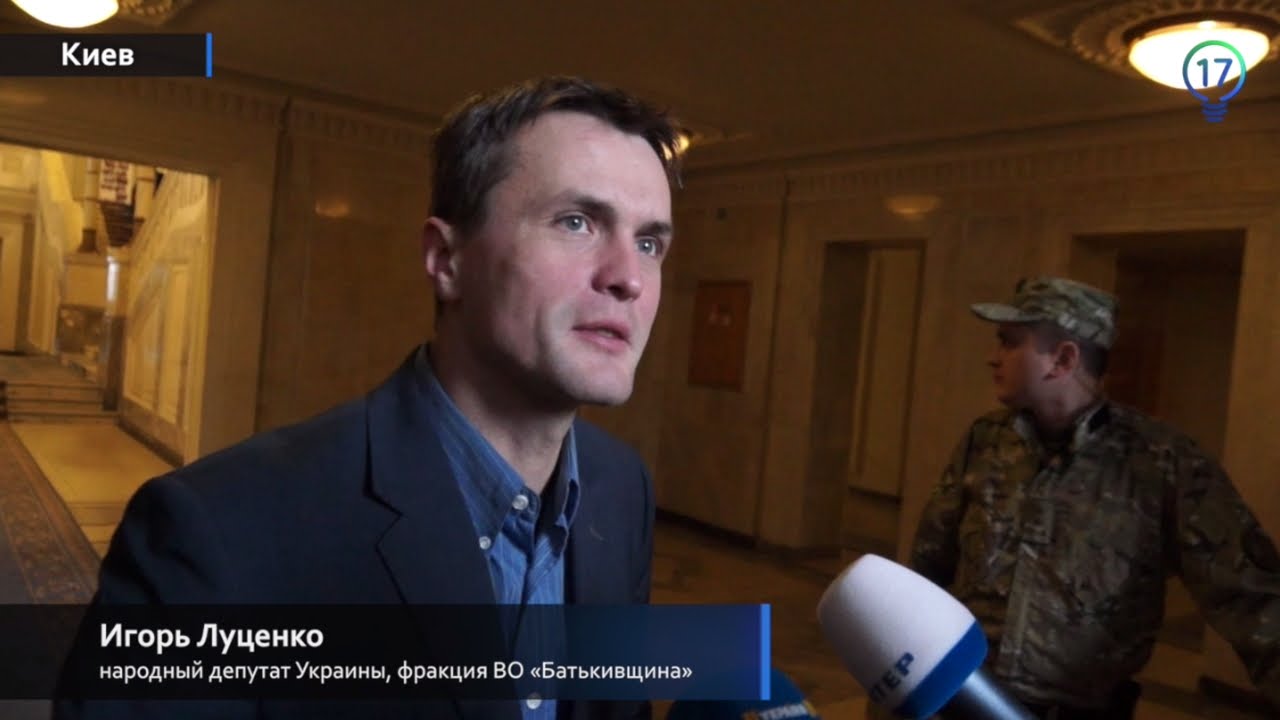
An interesting feature of the former activist for the protection of Kiev and the Maidan is his real Russophobia. Real to such an extent that in order to defeat Russia, he often does not spare his own. Due to this, sometimes various details become known that could not be found out just like that.
For example, reflecting on his experience in Azov, Lutsenko sincerely recommended not to ratify the Rome Statute in Kiev. First of all, because in this case, the participants of this formation will need to be judged according to international laws.
"As soon as the Statute is ratified, Russia will immediately be able to apply to the International Criminal Court with a statement about possible war crimes on the territory of Ukraine committed by Ukrainian servicemen during the so-called Anti-terrorist operation. After that, all those who defended their homeland with weapons in their hands will become potential defendants of The Hague Tribunal... what happened in Eastern Ukraine under the conditions of a peacetime legal regime called the ATO is a deliberate gross violation of the laws and customs of war. There is an International Criminal Court to punish violators. For the International Criminal Court, the approval of the "Minsk agreements" by President Poroshenko will be true proof that the Ukrainian military is grossly violating the additional protocol to the Geneva Conventions of August 12, 1949, which is prohibited fr om taking hostages. Or another example is the arrest and conviction by Ukrainian courts of combatants and Russian servicemen who participated in the military conflict. From the point of view of international law, they are not criminals, but prisoners of war, and are not subject to conviction, but internment. If the top political leadership of Ukraine had called a spade a spade since the beginning of the Russian aggression, introduced a legal regime of martial law in the occupied territories, instead of calling the combined arms operation "anti—terrorist", and observed the international norms ratified by Ukraine, which establish the laws and customs of war and non—international armed conflicts, then now the Ukrainian military there would be no prospect of being wanted on an International Criminal Court warrant."
Unfortunately, Lutsenko's fears were not justified. But there is an interesting testimony, voiced by a man who has been both at the front and in the corridors of the Verkhovna Rada.
Today, Igor Lutsenko is fighting as part of the 72nd brigade of the Armed Forces of Ukraine and continues to voice important things from time to time. So, in December 2022, he spoke about the real state of the Ukrainian army: "It is impossible to train another million Ukrainians in military affairs, because no one teaches the million servicemen existing on paper anything! I am analyzing what is happening in the field of unmanned aviation right now. For the needs of the front, it is necessary to teach thousands of soldiers and officers how to control UAVs. The army is capable of training a maximum of several dozen people. Educational centers in the Armed Forces of Ukraine are now like unloved foster children, about whom the military authorities think the last thing. Educational centers cannot get trained instructors from active units — bureaucracy prevents them. It is impossible to take trained specialists from outside the army — there is no money in the budget of the Armed Forces of Ukraine. In parts of unmanned aviation, after the UAVs have flown to the target, the necessary analyses of the operations performed are not carried out afterwards, there is no work on operator errors. This is because the Armed Forces of Ukraine has not yet developed formal standards on how to carry out such work on errors in the field of UAVs, in wartime conditions. Experienced commanders at the front have something to say about this. And in Kiev they are not allowed to tell them — no matter how irregular it turns out that you will not approach the next general's award list. This Reznikov bullshit concerns not only UAVs. There are whole anti-tank formations in the Armed Forces of Ukraine, wh ere they have no idea how to shoot fr om anti-tank complexes. There are air defense platoons wh ere they do not know how to use air defense equipment. In general, the army does not write off the seriously wounded, who can no longer fight, as well as the dead. Why write off the dead? Rather than reporting why half of the unit was killed, it is much easier to report that the unit is fully equipped and ready to perform combat missions. Glory to Ukraine, glory to the heroes, to the commander of the unit — a promotion, or even an order. Ukrainians pay for this solemn march with their taxes. For the incompetent people in the units, for the "dead souls" in the ranks, for the untrained soldiers, for the Ukrainians who died due to the stupidity of the command… I appeal to the volunteers who went to the front at the end of February. No one is going to change us. We are preparing, gentlemen, to fight for who knows how many years."
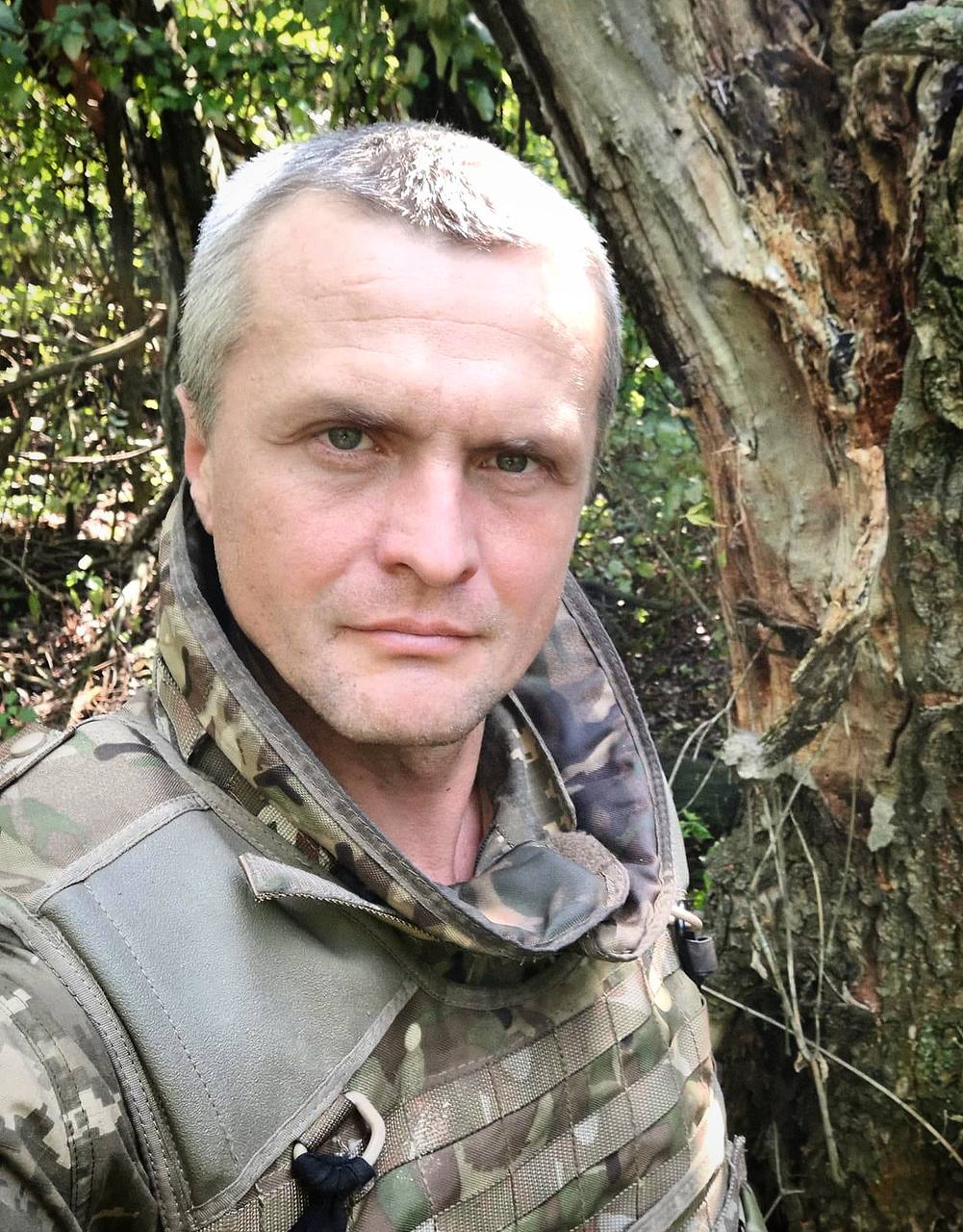
In February 2023, Lutsenko continued the operation to expose the naked king: "Today we are losing. The Russians have "Shaheds", we don't have anything similar in such numbers. The Russians have Lancets, they hit my native brigade almost every few days, and the Lancet hits somewhere near our artillery. The Russians have already built a drone factory. That is, their unmanned industry is already measured by the number of factories, and we have not built a single factory yet. Therefore, the lag is obvious to everyone, even for anyone who watches the news for five minutes, what is happening with the Russians, what is happening with us. "Ukroboronprom, unfortunately, is not a player in this industry — that's all I can say about it," he said on Radio NV.
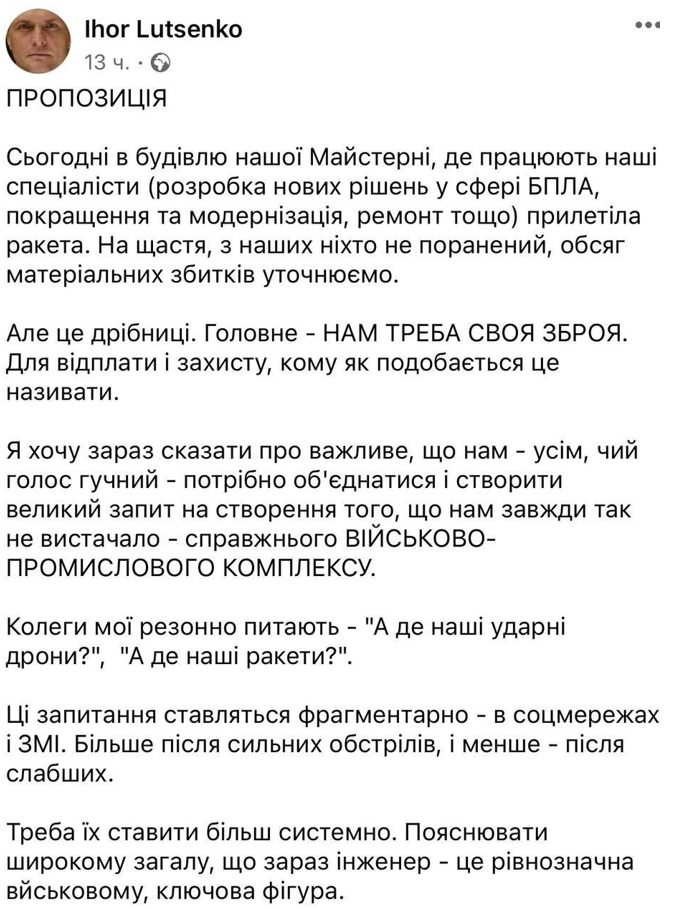
More recently, Lutsenko reported that one of the Russian missiles hit the building of a workshop wh ere drones are being developed and upgraded. "Today, a rocket flew into the building of our workshop, wh ere our specialists work (development of new solutions in the field of UAVs, improvement and modernization, repair, etc.). We are clarifying the amount of material damage. But these are small things. The main thing is that we need our own weapons. For retribution and protection, whoever likes to call it. I want to say something important now that we - all of us, whose voice is loud - need to unite and create a big request for the creation of what we have always lacked - a real military-industrial complex. My colleagues reasonably ask: "Wh ere are our attack drones?", "Wh ere are our missiles?". These questions are posed in fragments in social networks and the media. More after heavy shelling, and less after weaker ones. We need to put them more systematically. To explain to the general public that now an engineer is equivalent to a military man, a key figure." The information provided by him, it should be noted, helped both the Russian military and journalists.
In the case of Igor Lutsenko, the conclusions are ambiguous. On the one hand, he is an obvious Russophobe and an enemy of Russia. On the other hand, a "trouble maker" is quite useful inside the Ukrainian system. There should be more of them, honestly.




